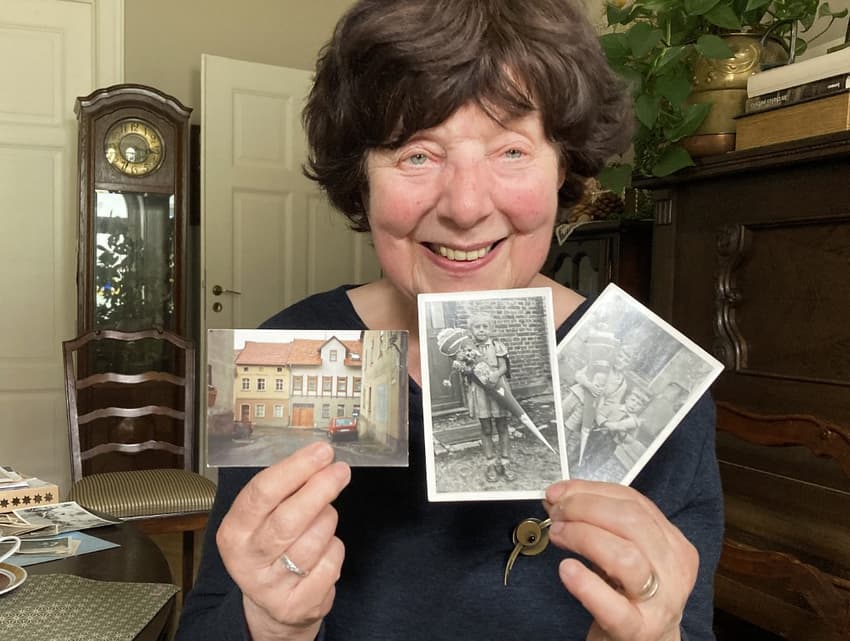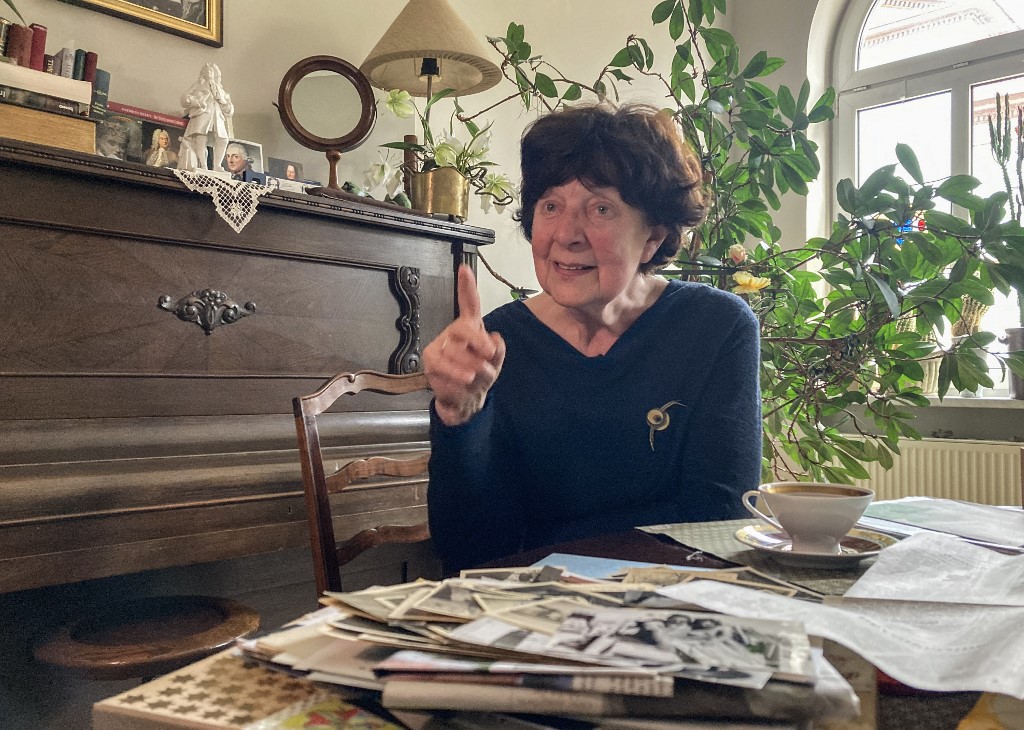Former East Germans ousted from homes fight for redress

When Marie-Luise Troebs looks at the doll's sideboard on her kitchen windowsill, her eyes fill with tears.
It's one of the few mementos she has left from her childhood home in the former East Germany.
In 1961, when she was 10 years old, Troebs and her family were evicted from the rural border town of Geisa by the Communist authorities.
They were sent to live in the city of Erfurt, 130 kilometres (80 miles) away.
More than six decades on, Troebs finally sees "a glimpse of hope" in her battle for compensation from the government.
Chancellor Olaf Scholz's party, the Social Democrats (SPD), wants to widen the pool of former East Germans classed as "victims" of injustice at the hands of the Communists -- and who are therefore entitled to compensation.
There were two major waves of resettlement of former East Germans from the border area towards the centre of the Communist-run DDR, in 1952 and in 1961.
The authorities justified the displacements by saying they needed to make way for infrastructure along the border and remove people considered a threat to order and security in the border area.
Altogether, some 12,000 people living along the border were forcibly relocated.
Around a thousand of them are still alive.
On the morning of October 3, 1961, Troebs and her family came home from church to see several trucks and armed police outside their house.
They were given just a few hours to pack their suitcases.
'Suddenly we had nothing'
"They led us into the street in front of everyone, as though we were criminals," a tearful Troebs told AFP.
"My father dwelt until the day he died on what it was we could have done wrong."

Marie-Luise Troebs sits at her kitchen table at home in front of old family photos and documents in Erfurt, eastern Germany, on April 25, 2023. (Photo by Claire MORAND / AFP)
Inge Bennewitz, 82, was a student in Potsdam when her parents were expelled from the village of Doemitz on the banks of the Elbe.
The trauma left "a scar that never healed" in their lives, she told AFP.
In their new home further west in Zoelkow, "there were only two small rooms, no kitchen, and the toilet was in the yard", she said.
"All of a sudden we had nothing."
Her family was described as "incorrigible" by a local newspaper.
"I never went to the town centre because I was afraid they would spit in my face," said Bennewitz, who runs a research group on forcibly displaced people.
"Society must repair this trauma or we'll never find peace," said Troebs, who heads an association of former East Germans fighting for compensation.
She is campaigning for reparations of 20,000 euros ($21,780) each for the victims.
'Hurry up'
Germany has been compensating victims of injustices committed under the former East German government since 1992.
These include former prisoners, forced labourers and people separated from their children.
But it does not cover people who were forcibly displaced.
READ ALSO: Germany agrees compensation for Kindertransport refugees
Because they have not been named as a specific group, the process of applying for compensation has been laborious and demands a high burden of proof.
"The events of 1952 and 1961 were a long time ago and the documents from the time are incomplete," said Evelyn Zupke, the government's top official in charge of atoning for the injustices of the Communist dictatorship.
Forcibly displaced people have also been excluded from a monthly pension -- currently worth 330 euros -- paid since 2007 to victims of political persecution in East Germany.
Elected to the post in 2021, Zupke is working with MPs and associations to broaden the scope of the compensation laws.
"I would stress to the politicians that we really must hurry up and honour those displaced persons who are still alive," said Zupke.
She welcomes the SPD's initiative and is calling for a bill to be tabled before the end of the year.
Comments
See Also
It's one of the few mementos she has left from her childhood home in the former East Germany.
In 1961, when she was 10 years old, Troebs and her family were evicted from the rural border town of Geisa by the Communist authorities.
They were sent to live in the city of Erfurt, 130 kilometres (80 miles) away.
More than six decades on, Troebs finally sees "a glimpse of hope" in her battle for compensation from the government.
Chancellor Olaf Scholz's party, the Social Democrats (SPD), wants to widen the pool of former East Germans classed as "victims" of injustice at the hands of the Communists -- and who are therefore entitled to compensation.
There were two major waves of resettlement of former East Germans from the border area towards the centre of the Communist-run DDR, in 1952 and in 1961.
The authorities justified the displacements by saying they needed to make way for infrastructure along the border and remove people considered a threat to order and security in the border area.
Altogether, some 12,000 people living along the border were forcibly relocated.
Around a thousand of them are still alive.
On the morning of October 3, 1961, Troebs and her family came home from church to see several trucks and armed police outside their house.
They were given just a few hours to pack their suitcases.
'Suddenly we had nothing'
"They led us into the street in front of everyone, as though we were criminals," a tearful Troebs told AFP.
"My father dwelt until the day he died on what it was we could have done wrong."

Inge Bennewitz, 82, was a student in Potsdam when her parents were expelled from the village of Doemitz on the banks of the Elbe.
The trauma left "a scar that never healed" in their lives, she told AFP.
In their new home further west in Zoelkow, "there were only two small rooms, no kitchen, and the toilet was in the yard", she said.
"All of a sudden we had nothing."
Her family was described as "incorrigible" by a local newspaper.
"I never went to the town centre because I was afraid they would spit in my face," said Bennewitz, who runs a research group on forcibly displaced people.
"Society must repair this trauma or we'll never find peace," said Troebs, who heads an association of former East Germans fighting for compensation.
She is campaigning for reparations of 20,000 euros ($21,780) each for the victims.
'Hurry up'
Germany has been compensating victims of injustices committed under the former East German government since 1992.
These include former prisoners, forced labourers and people separated from their children.
But it does not cover people who were forcibly displaced.
READ ALSO: Germany agrees compensation for Kindertransport refugees
Because they have not been named as a specific group, the process of applying for compensation has been laborious and demands a high burden of proof.
"The events of 1952 and 1961 were a long time ago and the documents from the time are incomplete," said Evelyn Zupke, the government's top official in charge of atoning for the injustices of the Communist dictatorship.
Forcibly displaced people have also been excluded from a monthly pension -- currently worth 330 euros -- paid since 2007 to victims of political persecution in East Germany.
Elected to the post in 2021, Zupke is working with MPs and associations to broaden the scope of the compensation laws.
"I would stress to the politicians that we really must hurry up and honour those displaced persons who are still alive," said Zupke.
She welcomes the SPD's initiative and is calling for a bill to be tabled before the end of the year.
Join the conversation in our comments section below. Share your own views and experience and if you have a question or suggestion for our journalists then email us at [email protected].
Please keep comments civil, constructive and on topic – and make sure to read our terms of use before getting involved.
Please log in here to leave a comment.